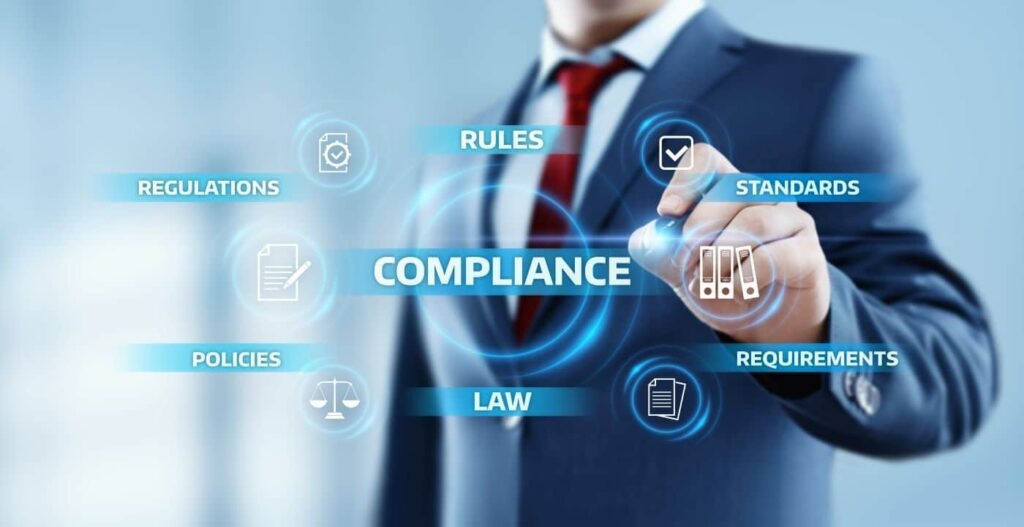In the dynamic landscape of the digital age, businesses are entrusted with the responsibility of safeguarding sensitive information and ensuring ethical practices in the processing of personal data. Compliance and data protection laws play a pivotal role in shaping how organizations handle, store, and manage information. This comprehensive guide aims to provide a thorough understanding of compliance, key data protection laws, and best practices for navigating this complex terrain.
Compliance: Navigating the Regulatory Landscape
Key Aspects of Compliance:
- Data Protection Laws:
- GDPR (General Data Protection Regulation): Enforced in the European Union, GDPR governs the processing of personal data and grants individuals control over their information.
- HIPAA (Health Insurance Portability and Accountability Act): Focused on healthcare, HIPAA ensures the confidentiality and security of health information.
- Financial Compliance:
- Sarbanes-Oxley Act (SOX): Mandates accurate financial reporting and internal controls to protect investors and the public.
- Industry-Specific Regulations:
- Various industries have specific compliance requirements; for instance, PCI DSS applies to businesses handling credit card information.
- International Compliance:
- Global operations require adherence to various international regulations, necessitating a nuanced understanding of cross-border compliance.
Data Protection Laws: Safeguarding Personal Information
1. GDPR (General Data Protection Regulation):
– Scope: Applies to all businesses processing personal data of individuals in the EU, irrespective of the business’s location.
– Key Provisions: Individuals gain control over personal data, and there are strict requirements for data controllers and processors.
2. CCPA (California Consumer Privacy Act):
– Scope: Applicable to businesses collecting and processing personal information of California residents.
– Key Provisions: Grants California consumers the right to know what data is collected and the right to opt out of data sales.
3. LGPD (Lei Geral de Proteção de Dados):
– Scope: Brazil’s data protection law governing personal data processing within the country.
– Key Provisions: Similar to GDPR, LGPD grants individuals rights over their data and imposes obligations on organizations.
4. Personal Information Protection Law (PIPL) – China:
– Scope: Regulates the processing of personal information within the People’s Republic of China.
– Key Provisions: Imposes obligations on data handlers regarding the collection, processing, and protection of personal information.
5. Data Protection Act 2018 – UK:
– Scope: The UK’s post-Brexit data protection law, closely aligned with GDPR.
– Key Provisions: Governs the processing of personal data in the UK, outlining individual rights and organizational obligations.
Best Practices for Compliance: Navigating the Path to Responsibility
- Data Mapping and Classification:
- Understand the data lifecycle, mapping its journey from collection to disposal. Classify data based on sensitivity to tailor security measures.
- Privacy by Design:
- Infuse data protection measures into the design and development of systems, products, and processes, ensuring privacy is inherent.
- Consent Management:
- Obtain explicit and informed consent before processing personal data. Provide individuals with the ability to control and withdraw their consent.
- Data Security Measures:
- Implement robust security measures, including encryption and access controls, to protect data from unauthorized access, breaches, or cyber threats.
- Regular Audits and Assessments:
- Conduct regular audits and risk assessments to ensure ongoing compliance with relevant laws and regulations. Identify and address vulnerabilities promptly.
- Employee Training:
- Educate employees on data protection policies, procedures, and the importance of compliance. Foster a culture of security awareness within the organization.
- Incident Response Plan:
- Develop and maintain an incident response plan to address and report data breaches promptly. This includes clear communication protocols and collaboration with relevant authorities.
- Data Subject Rights:
- Respect and facilitate individuals’ rights, including the right to access, correct, or delete their personal data. Establish streamlined processes for handling data subject requests.
Remember that compliance is an ongoing commitment, and staying informed about changes in regulations is critical for maintaining a secure and legally compliant business environment. Consulting legal professionals for advice tailored to your specific situation and jurisdiction is always recommended. By embracing a proactive approach to compliance, organizations can foster trust, mitigate risks, and contribute to a more secure digital ecosystem.



